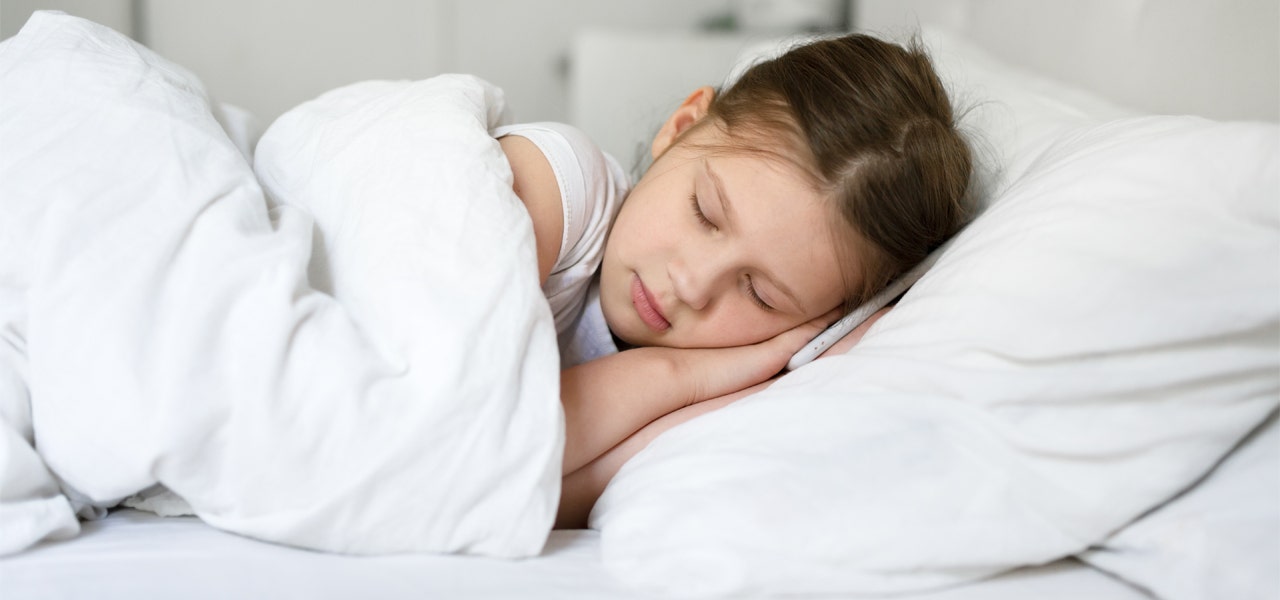For many of us with children, if someone offered a magical and completely safe pill guaranteed to help our children sleep … we’d very seriously consider it. And who could blame us? If you have a child that has difficulty with sleep, you’re bound to be tired and maybe a little desperate. If swallowing something would fix it, the temptation would be real.
Of course, no such magical remedy exists and understanding sleep problems in children can be a long and difficult process.
While some little ones have no issues with sleep, most children will, at some point in their childhood, have some difficulties with sleep. This is totally normal and expected. In fact, evidence shows that MOST babies aren’t sleeping through the night at 6 months and a high percentage continue to have interrupted nighttime sleep duration in that first year.
Sleep woes for parents don’t just disappear after that first birthday either. Toddlers, preschoolers, and even young school-aged children may go through periods of difficulty sleeping through the night. Often this isn’t a problem because they supplement their nighttime sleep with naps during the day … those lucky little beasts.
Sleep duration isn’t the only sleep concern, either. Sleep quality fluctuates in childhood as well, which matters because good quality sleep often means better duration, too. The old saying “sleep begets sleep” is true.
Behavior Is Communication
As a parenting coach, I’m regularly reminding parents that behavior is communication. Yes, even challenging sleep behavior is communication. A child waking up at night and having difficulty getting back to sleep isn’t doing so on purpose to make you miserable. They’re likely even more miserable than you and they probably want to sleep just as badly.
Even if your child insists that’s not the case, chances are that something’s up. It may take some sleuthing to figure out what their behavior is communicating – there are a number of reasons a child may have difficulty sleeping – but whatever the cause, there is always a reason.
If it goes on for more than a few nights, it’s a good idea to talk with your child’s doctor as sleep disruptions can be related to some health concerns.
Common Causes of Sleep Problems in Children
In children, occasional sleep disruptions happen for a number of reasons, including:
- Teething
- Illness
- Growth spurts
- Nightmares
- Developmental leaps
- Anxiety
- Emotional distress
- Sensory processing challenges
- Neurodiversities
- Physical activity level
- Sunlight exposure
- Bedtime routine
- Time changes
- Being too hot or too cold
Health issues, everything from acid reflux/GERD to sleep disorders to more serious conditions, can also affect your child’s sleep. All of these factors mean that it can be difficult to nail down the cause. Luckily, there are steps we can take to help while we are playing detective.


The Relationship Between Nutrition and Sleep
One often overlooked step is related to what is eaten not only before bed but throughout the day. What your child eats (and you for that matter) can have an impact on their sleep.
A study of Lebanese children indicated an important link between children’s nutrition and sleep health. The study found that some foods directly impact sleep induction time (how long a child spends deliberately trying to fall asleep), while other foods play a part in how well your child can regulate their sleep. Additionally, the study noted, “... in the long term, nutritional elements can alter inflammatory biomarkers that were described to affect sleep patterns.” Read more here.
Though, as I mentioned, there is no safe, magic pill to help a child sleep, there are some options to swallow that may help children and adults alike get a little better shut-eye. In general, a balanced and adequate diet supports sleep. This refers to a diet that is high in:
- Lean proteins
- Good quality fats
- Whole grains
- Fruits and vegetables
Energy restriction (i.e. “dieting”) is known to hamper sleep so being sure your child is eating enough is a good starting point. A diet that is restrictive of specific macronutrients may also disrupt sleep – not enough carbohydrates may make it difficult to stay asleep, not enough good fat may interfere with the stages of sleep, and not enough fiber may lead to more wake-ups.
Though more research is needed, there is evidence that balanced nutrition matters when it comes to sleep quality.
The irony of course is that poor sleep can directly impact diet by increasing cravings, leading to seeking easy energy through high carbohydrate foods, and compensating with high caffeine options such as energy drinks and soda, all of which in turn can negatively impact sleep.
Diet and Sleep Problems: What to Avoid
Parents know that a sugary soft drink isn’t going to help their child to settle and sleep well, but there are plenty of other foods and drinks that can mess with sleep. Caffeine and sugar are probably on every parent’s radar for making sleep difficult, but did you know that pizza night can throw a wrench in your sleep dreams?
This study shows that low fiber and high saturated fat and sugar intake is associated with lighter, less restorative sleep with more arousals. Confusingly though, some of the foods that make us feel sleepy after eating them (think of how you’re ready for a nap after a big holiday meal) can in fact contribute to lower quality, more disruptive sleep.
High carb meals may leave us wanting a nap but they actually interfere with our sleep once we head to bed, as this study found.
So, How Can Food Help Children With Sleep Problems?


The foods that can really help with what researchers call “sleep architecture” may not make us feel tired right away but set us up for better quality sleep. Examples include milk, certain fish and whole grains.
Could having salmon for dinner mean more shut eye? It’s possible, especially if you’re lucky enough to have a child that actually likes it! (Sending good vibes to the parents of picky eaters!) The Omega-3s in salmon and other foods can help the brain rest.
In addition to the foods themselves, when they are consumed may be impactful as well. This study found that eating two kiwi fruit two hours before bed improved sleep for the research participants. Eating too close to bedtime can ruin the chance of a good night’s sleep.
Foods that May Help Sleep
You’ve probably heard that it is tryptophan in turkey that makes one sleep but it’s also the protein. Fats that come from nuts and vegetables along with lower refined carb intake can also make a positive difference in children’s sleep, as shown in this study. For better quality sleep, your kids can try:
- Milk
- Whole grains
- Fatty fish
- Kiwifruit
- Cherries
- Walnuts
- Vegetables
- Other fruits
- Foods high in fiber
- Foods high in magnesium
- Foods high in monounsaturated and polysaturated fats
- Foods high in Omega-3s
Foods that May Interfere with Sleep
I’ve already covered the basics here, but if your child is struggling with sleep, it’s smart to avoid:
- Coffee
- Chocolate
- Refined sugar
- Saturated fats
- Foods high in saturated or trans fats
(Not sure what the different types of fats are or what foods have what types of fats? This list may help.)
Helpful Food and Lifestyle Practices for Sleep
With any struggle in life, we often find that timing is everything. Here are a few pointers related to diet and sleep problems:
- Have meals at regular set times
- No food 2-3 hours before intended sleep times
- No caffeine after 2 p.m. (beware of hidden caffeine such as chocolate and some granola or protein bars)
- Decrease carbs toward the end of the day
- Move sweet treats to the middle of the day, rather than the end of the day
In addition to a balanced diet, you can try other lifestyle changes to help your child sleep. For example, a consistent bedtime routine, limited screen time with no screens at least 30 minutes prior to desired sleep time, fresh air and sunlight exposure during the day, moderate to vigorous physical activity, and a cool, dark sleep environment. These are all evidence-based steps for helping your child sleep well.
It’s also important to simply monitor how much time your child is sleeping and to assess this as they grow. The National Sleep Foundation and the American Academy of Pediatrics provide sleep recommendations for children of all ages:
- 11–14 hours for preschoolers
- 9–11 hours for school-aged children
- 8–10 hours for teenagers
Best of luck, parents! You’re not alone in dealing with sleep issues, but you are smart to try to address them. You and your kids will be better for it.
 BABY
BABY  KIDS
KIDS  ADULT
ADULT  LEARN
LEARN  STORES
STORES 
